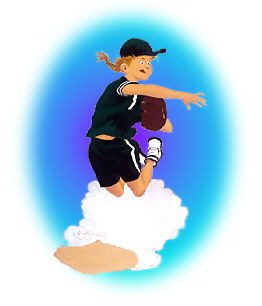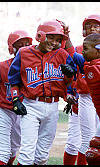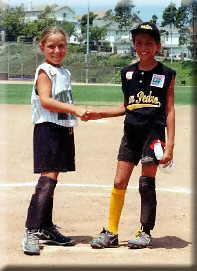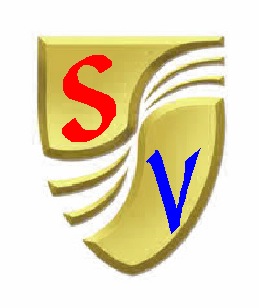|
 VigilanceVoice
VigilanceVoice

VigilanceVoice.com
Wednesday--August
21, 2002—Ground
Zero Plus 343
The Art Of Building
"Big League Citizens"
by
Cliff McKenzie
Editor, New York City Combat Correspondent News
GROUND ZERO, New York
City, August 20--Jeremy Lopez rounds home plate after hitting a home
run to give the Harlem Little League team a 5-2 win over a top California
team. The win put them in the quarter finals.
Earlier in the game, 12-year-old
Andrew Diaz crushed a two-run homer to give Harlem a 3-2 lead.
Diaz got excited and began to "dance" his way to home plate. Little
League officials reportedly warned Harlem manager, Morris McWilliams about
"showboating," saying it was "un-sportsmanship conduct."
"I got too excited," said Diaz after
the game. "I'm sorry for what I did. I wasn't thinking."
"Our job isn't to build big league
baseball players," commented McWilliams who was livid over his player's
hot dogging, "it's to build big league citizens."
I liked that comment a lot.
When our children were growing up, my
wife managed and I coached Bobby Sox Softball. Since we had
two daughters, we had the pleasure of watching the evolution of young
girls into mature, confident young women--in part because of the game they
learned to play.
We started out at age five until the
girls were in their early teens. Along the way we found
on our team girls with little confidence. Working with them to
teach them skills of catching, throwing and batting, we helped develop
both a sense of achievement and citizenship.
Softball
or baseball is a team sport. Players learn to work with one
another, each "backing up" the other in case one misses the ball.
They learn the art of relay--throwing the ball from one player to another
to stop the runner from scoring. They learn base stealing,
watching for signals, and the triumph of victory, and the bile of defeat.
Coaching was all about citizenship
for me, and, I would be reasonably on target to assume that was the goal
for my wife also. One particular player on our team was
"slow." We worked hard with her. Her self confidence was such
she wouldn't look you in the eye, held her head down, and cried frequently
because of her ineptitude. We kept working and encouraging
her, for there was a spark of achievement in her soul, the one only a
coach or manager can see.
The young girl wasn't very adroit at
school, barely getting by. She came from a broken family and
the scars showed on her face and being. Over a few years of
coaching, she became a pitcher. She found herself being able to gain
a sense of self worth on the pitcher's mound and her control began to
improve.
Ultimately, she attended college on a
softball scholarship, graduated, and now lives a relatively happy life.
 |
I remember her
specifically because she stood out of the crowd. We coached
and managed nearly a hundred young girls including our daughters over nearly eight years.
We encouraged them to be confident,
self-motivated young women on and off the team. We were
fortunate to be part of helping coach our all star team the year they won
the national championship. So I understand the "hot dogging"
of a player who has reached a zenith in self achievement and expresses it
histrionically. I also understand a coach being more concerned
about teaching his players to be "big league citizens" than "big league
baseball players."
Citizenship is all about teamwork.
It is the ability of one person to care
about the welfare of other persons. We have family
citizenships, neighborhood citizenships, city citizenships, state
citizenships, national citizenships and global citizenships.
While Harlem is playing for its
neighborhood, it is also playing for New York City and for America, and
ultimately, for all the children of the world.
I think that is what Coach McWilliams
was most concerned about. He wants his players to know that
they represent the Sentinels of Athletic Vigilance, that they are not
there to promote themselves, as much as they are to promote the
"citizenship of teamwork."
No athlete can ever take credit solely for
his or her achievements. There are coaches, fans, trainers,
managers, sponsors--a raft of people working behind the scenes to help
them achieve. The same is true in life.
That's what being a Citizen of Vigilance is all
about. It's about recognizing the duty and obligation we all have to
respect one another, and to use the resources of each of us to defend
ourselves against the wiles of Terrorism--both the Emotional and Physical
generations of Terrorism.
Harlem had its moments of Terrorism when its team
was attacked on the grounds all the players weren't residents of the
community. An investigation ensued. There were
closed-door meetings as officials reviewed each child's residency to see
if it was valid within the Little League rules.
This came on the heels of a scandal where another
team a year ago had been disqualified because of forging birth
certificates.
Waiting for the decision to come must have been
like waiting to go into the dentist's office for the team. But
they prevailed. In the wash, their clothes were clean.
They went to the Little League Championships.
Regardless of
the final outcome of the team, there can be no doubt Harlem has
experienced both Terrorism and Vigilance on its journey to glory.
The Fear, Intimidation and Complacency of waiting to find out if the team
qualified must have ravaged the player's and coaches and managers.
Vigilance then took hold. Competitively, they have mustered
the Courage, Conviction and taken the Right Actions leading to their berth
in the quarter finals.
They have become "Citizens of Vigilance."
Go
To Aug 20--Terror Backfires On Terrorism
©2001
- 2004, VigilanceVoice.com, All rights reserved - a ((HYYPE))
design
|
|







